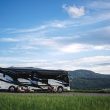Your RV is packed. You’ve got the pantry stocked, the grill is prepared, and DVDs for the kids are at the ready. Hold on… are you aware of the RV rules of your destination?
It happens all the time. In the midst of stocking an RV to the brim of necessities for a weekend, checking for any RV rules or regulations slipped your mind.
We love getting out on the open road just as much as our readers and fellow RVers, but it’s important to know the RV-specific rules and regulations for wherever you’re traveling. We can help you with that! Keep reading for a list of guidelines to be aware of before heading out!
Your Driver’s License
For the most part, your current license should be acceptable, if you’re driving a regular-sized motorhome or RV.
However, there are some pretty massive RVs out there (looking at you, Class As). If this is you, your state might require you to attain a commercial driver’s license or CDL. Other states take it a step further and require another license if your rig is larger, usually over 26,000 pounds or more.
Again, unless you’re driving a huge motorhome or doing lots of towing, this isn’t something to worry about. To be sure, you can read your manual or head to your trusted dealership and ask for help.
Specific rules for campgrounds
If you’ve even been to just a few parks and campgrounds in your lifetime, you know they all have their own set of rules! Some rules might seem minor or trivial, but they’re all for your safety, so it’s important to mind them.
For example, many campgrounds won’t allow campers to carry in their own firewood. This is so certain bugs and species aren’t spread into places where they can cause a ruckus.
Another rule to watch out for is trailer size. The average size is 27 feet, but some campground restrictions can vary from 20-40 feet. Multiple parks have limited campsites for larger RVs, so be sure to reserve your spot early enough.
You can also expect the basic rules, such as not bringing glass containers, fireworks, or even alcohol in most places. If the item is questionable, stay on the safe side – leave it at home!
We hope these rules and regulations are a few you’ll keep in mind as you continue your adventures through Mother Nature.
Trailer restrictions
If you don’t have a motorhome and plan to use your tow vehicle to tow your rig, there are quite a few regulations to follow. Think about safety items such as any hitches, braking systems, and anything that helps you control trailer sway. These are normally devices you’re required to have on your trailer. It may sound like overkill, but they’re all to protect you and others on the road.
Food Storage
This isn’t necessarily a “rule of the road,” but we’re mentioning it, because how you store your food while camping is crucial to the safety of you and others. Many coolers are bear-resistant, meaning a strong animal won’t be able to open it. Make sure the ones you purchase are “bear boxes.”
The minute you’re done eating, start to pack and store any leftovers, as most animals have no problem scouring around until they find something to feed their bellies. Keep food put away and close any vents, windows, and doors anytime you leave your campsite.
All of these rules can seem small, but each one is important to be safe and secure on the road. Though they vary, each campground, especially national parks, always have a list of regulations in place so everyone visiting can enjoy themselves.
Some of these rules may or may not apply to you, but if you’re a regular in the camping world, it’s great knowledge to have! Happy camping!






